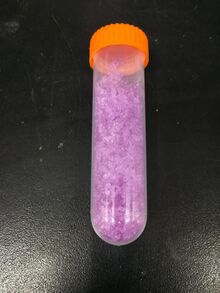Chemistry:Neodymium nitrate
From HandWiki
Short description: Inorganic chemical compound

| |
| Names | |
|---|---|
| Other names
Neodymium trinitrate
| |
| Identifiers | |
| |
3D model (JSmol)
|
|
| ChemSpider | |
| EC Number |
|
PubChem CID
|
|
| |
| |
| Properties | |
| Nd(NO3)3 | |
| Molar mass | 330.25 g/mol (anhydrous) 438.35 g/mol (hexahydrate) |
| Appearance | vibrant pink/violet solid |
| Density | 6.5g/cm3 |
| Melting point | 1,374 °C (2,505 °F; 1,647 K) |
| Structure | |
| Tricapped trigonal prismatic (nine-coordinate) | |
| Hazards | |
| GHS pictograms |  
|
| GHS Signal word | Warning |
| H272, H302, H312, H315, H319, H332, H335 | |
| P261, P264, P270, P271, P280, P301+312, P302+352, P304+312, P304+340, P305+351+338, P312, P321, P322, P330, P332+313, P337+313, P362, P363, P403+233, P405, P501 | |
Except where otherwise noted, data are given for materials in their standard state (at 25 °C [77 °F], 100 kPa). | |
| Infobox references | |
Neodymium nitrate is a chemical compound with the formula Nd(NO3)3. It is typically encountered as the hexahydrate, Nd(NO3)3·6H2O, which is more accurately formulated as [Nd(NO3)3(H2O)4].2H2O to reflect the crystal structure.[1] It decomposes to NdONO3 at elevated temperature.[2] This water-soluble salt finds use in fabrication of perovskite (CaTiO3) based solid oxide fuel cells, synthesis of Nd3+ doped vanadium pentoxide (V2O5) nanostructure for potential usage in supercapacitors and as a catalyst for Friedlander synthesis of surface modified quinolones for application in medicinal chemistry.[3]
References
- ↑ Rogers, D. J.; Taylor, N. J.; Toogood, G. E. (1983). "Tetraaquatrinitratoneodymium(III) dihydrate, [Nd(NO3)3(H2O)4].2H2O". Acta Crystallogr. C 39 (8): 939–941. doi:10.1107/S0108270183006927.
- ↑ Van Vuuren, C.P.J.; Strydom, C.A. (1986). "The thermal decomposition of neodymium nitrate". Thermochimica Acta 104: 293–298. doi:10.1016/0040-6031(86)85204-2. ISSN 0040-6031.
- ↑ Varala, Ravi; Enugala, Ramu; Adapa, Srinivas R. (2006). "Efficient and Rapid Friedlander Synthesis of Functionalized Quinolines Catalyzed by Neodymium(III) Nitrate Hexahydrate". Synthesis 2006 (22): 3825–3830. doi:10.1055/s-2006-950296.
External links
Salts and covalent derivatives of the nitrate ion
| HNO3 | He | ||||||||||||||||
| LiNO3 | Be(NO3)2 | B(NO3)−4 | C | NO−3, NH4NO3 |
O | FNO3 | Ne | ||||||||||
| NaNO3 | Mg(NO3)2 | Al(NO3)3 | Si | P | S | ClONO2 | Ar | ||||||||||
| KNO3 | Ca(NO3)2 | Sc(NO3)3 | Ti(NO3)4 | VO(NO3)3 | Cr(NO3)3 | Mn(NO3)2 | Fe(NO3)3, Fe(NO3)2 |
Co(NO3)2, Co(NO3)3 |
Ni(NO3)2 | Cu(NO3)2 | Zn(NO3)2 | Ga(NO3)3 | Ge | As | Se | Br | Kr |
| RbNO3 | Sr(NO3)2 | Y(NO3)3 | Zr(NO3)4 | Nb | Mo | Tc | Ru | Rh | Pd(NO3)2 | AgNO3 | Cd(NO3)2 | In | Sn | Sb(NO3)3 | Te | I | Xe(NO3)2 |
| CsNO3 | Ba(NO3)2 | Hf | Ta | W | Re | Os | Ir | Pt | Au | Hg2(NO3)2, Hg(NO3)2 |
Tl(NO3)3, TlNO3 |
Pb(NO3)2 | Bi(NO3)3 BiO(NO3) |
Po | At | Rn | |
| FrNO3 | Ra(NO3)2 | Rf | Db | Sg | Bh | Hs | Mt | Ds | Rg | Cn | Nh | Fl | Mc | Lv | Ts | Og | |
| ↓ | |||||||||||||||||
| La(NO3)3 | Ce(NO3)3, Ce(NO3)4 |
Pr | Nd(NO3)3 | Pm | Sm | Eu(NO3)3 | Gd(NO3)3 | Tb(NO3)3 | Dy | Ho | Er | Tm | Yb | Lu | |||
| Ac(NO3)3 | Th(NO3)4 | Pa | UO2(NO3)2 | Np | Pu | Am | Cm | Bk | Cf | Es | Fm | Md | No | Lr | |||
 |

